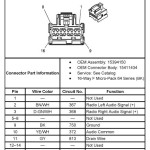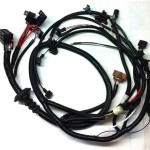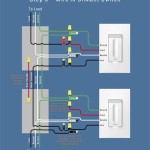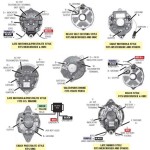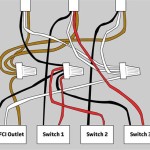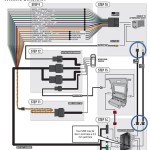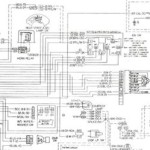Brake Controller Wiring refers to the electrical connections between a brake controller and the towing vehicle’s electrical system. For example, when a trailer is connected to a pickup truck, the brake controller wiring allows the brake controller to communicate with the vehicle’s brake system, enabling the driver to apply the trailer’s brakes in sync with the vehicle’s brakes.
Brake controller wiring is crucial for safe towing as it ensures that the trailer’s brakes are properly engaged when the towing vehicle’s brakes are applied. Benefits include improved towing stability, reduced stopping distances, and increased braking efficiency. A key historical development in brake controller wiring was the introduction of proportional braking systems, which allowed for more precise and responsive trailer braking.
The following paragraphs will explore the components and installation of brake controller wiring, providing detailed instructions for various vehicle and trailer configurations.
Brake Controller Wiring is the electrical network that connects the brake controller to the towing vehicle’s electrical system and the trailer’s brakes. Its key aspects include:
- Installation: Proper installation is crucial for safe and effective braking.
- Wiring Harness: The wiring harness includes the necessary wires and connectors for the brake controller.
- Brake Controller: The brain of the system, responsible for modulating the trailer’s brakes.
- Power Supply: Provides the electrical power for the brake controller and trailer brakes.
- Grounding: Ensures a complete electrical circuit and prevents electrical issues.
- Trailer Brakes: The physical braking components on the trailer that are actuated by the brake controller.
- Towing Vehicle: Provides the power and electrical system for the brake controller.
- Safety: Properly installed and maintained brake controller wiring is essential for safe towing.
- Maintenance: Regular inspection and maintenance help ensure the system’s reliability and effectiveness.
These aspects are interconnected and play vital roles in the operation of the brake controller wiring system. Proper installation, maintenance, and understanding of these aspects are crucial for safe and effective trailer braking.
Installation
Proper installation of brake controller wiring is paramount for the safety and effectiveness of the entire towing system. Incorrect installation can lead to a variety of issues, including trailer brake malfunction, reduced braking efficiency, and even dangerous situations while towing. Therefore, it is essential that brake controller wiring is installed by a qualified professional or by following the manufacturer’s instructions carefully.
One critical aspect of proper installation is ensuring that all electrical connections are secure and free of corrosion. Loose or corroded connections can cause intermittent or complete failure of the brake controller wiring, which can be extremely dangerous while towing. Additionally, the wiring harness should be routed away from sources of heat and sharp edges to prevent damage. Furthermore, the brake controller should be mounted in a location that is easily accessible for adjustments and maintenance.
Real-life examples of improper brake controller wiring installation include:
- Loose or disconnected wires
- Damaged or frayed wiring harness
- Incorrectly mounted brake controller
- Improper grounding
These issues can lead to a variety of problems, such as:
- Trailer brakes not functioning properly
- Reduced braking efficiency
- Electrical shorts or fires
Understanding the importance of proper brake controller wiring installation is crucial for safe towing. By ensuring that the wiring is installed correctly, you can help prevent accidents and protect yourself and others on the road.
Wiring Harness
The wiring harness is an essential component of brake controller wiring. It provides the physical connections between the brake controller and the towing vehicle’s electrical system and the trailer’s brakes. Without a properly functioning wiring harness, the brake controller would not be able to communicate with the trailer’s brakes, potentially leading to dangerous situations while towing.
There are several real-life examples of the importance of a properly functioning wiring harness in brake controller wiring. For instance, a loose or disconnected wire in the wiring harness can cause intermittent or complete failure of the trailer brakes. This can be extremely dangerous, especially in situations where the driver needs to brake suddenly.
Understanding the relationship between the wiring harness and brake controller wiring is crucial for safe towing. By ensuring that the wiring harness is properly installed and maintained, you can help prevent accidents and protect yourself and others on the road.
Brake Controller
The brake controller is a critical component of brake controller wiring, serving as the central processing unit that manages the application of the trailer’s brakes. Without a properly functioning brake controller, the trailer’s brakes may not engage or may not engage properly, potentially leading to dangerous situations while towing.
The brake controller receives input from the towing vehicle’s brake pedal and uses this input to determine how much braking force to apply to the trailer’s brakes. The brake controller then sends a signal to the trailer’s brakes, which in turn apply the appropriate amount of braking force.
Real-life examples of the importance of the brake controller in brake controller wiring include:
- A faulty brake controller can cause the trailer’s brakes to engage too early or too late, resulting in reduced braking efficiency or even skidding.
- A damaged brake controller can cause the trailer’s brakes to fail completely, which can be extremely dangerous in emergency situations.
Understanding the relationship between the brake controller and brake controller wiring is crucial for safe towing. By ensuring that the brake controller is properly installed and maintained, you can help prevent accidents and protect yourself and others on the road.
Power Supply
A reliable power supply is crucial for the effective operation of brake controller wiring. Without a sufficient power supply, the brake controller and trailer brakes may not function properly, potentially leading to dangerous situations while towing.
The power supply provides the electrical current necessary for the brake controller to operate. The brake controller then uses this power to send signals to the trailer’s brakes, which in turn apply the appropriate amount of braking force. Without a properly functioning power supply, the brake controller may not be able to send signals to the trailer’s brakes, or the signals may be too weak to engage the brakes effectively.
Real-life examples of the importance of a power supply in brake controller wiring include:
- A loose or disconnected power wire can cause the brake controller to lose power, resulting in the trailer’s brakes not functioning properly.
- A damaged power supply can cause the brake controller to malfunction, potentially leading to the trailer’s brakes engaging too early or too late.
Understanding the relationship between the power supply and brake controller wiring is crucial for safe towing. By ensuring that the power supply is properly installed and maintained, you can help prevent accidents and protect yourself and others on the road.
Grounding
Grounding plays a crucial role in brake controller wiring by providing a complete electrical circuit and preventing electrical issues. Without proper grounding, the brake controller may not function correctly, potentially leading to dangerous situations while towing. Grounding ensures that there is a low-resistance path for electrical current to flow, completing the circuit and allowing the brake controller to communicate effectively with the trailer’s brakes.
In brake controller wiring, the ground wire is typically connected to the vehicle’s chassis or frame, which provides a direct path to the negative terminal of the battery. This creates a complete circuit for the electrical current to flow from the power source, through the brake controller, to the trailer’s brakes, and back to the negative terminal of the battery.
Real-life examples of the importance of grounding in brake controller wiring include:
- A loose or disconnected ground wire can cause the brake controller to malfunction, resulting in the trailer’s brakes not functioning properly.
- A damaged ground wire can cause electrical interference, leading to erratic behavior of the brake controller or other electrical components in the towing vehicle.
Understanding the importance of grounding in brake controller wiring is essential for safe towing. By ensuring that the ground wire is properly connected and maintained, you can help prevent accidents and protect yourself and others on the road.
Trailer Brakes
Within the comprehensive system of “Brake Controller Wiring,” “Trailer Brakes: The physical braking components on the trailer that are actuated by the brake controller.” stand as crucial elements, translating electrical signals into mechanical force to decelerate the trailer. Understanding their significance and exploring their multifaceted aspects are essential for ensuring safe and effective towing.
-
Brake Drums/Discs
These rotating components, typically made of cast iron or steel, provide the friction surface against which the brake pads/shoes press to generate stopping power.
-
Brake Pads/Shoes
These consumable components, made of friction material, are pressed against the brake drums/discs to create friction and slow down the trailer.
-
Brake Calipers/Wheel Cylinders
These hydraulic or mechanical devices convert the brake controller’s electrical signals into mechanical force, actuating the brake pads/shoes against the brake drums/discs.
-
Brake Lines/Hoses
These flexible conduits carry brake fluid from the brake controller to the brake calipers/wheel cylinders, transmitting the hydraulic pressure needed for braking.
These components orchestrate a synchronized braking response, ensuring the trailer’s deceleration matches the towing vehicle’s, enhancing stability and overall safety. Regular maintenance and inspection of “Trailer Brakes: The physical braking components on the trailer that are actuated by the brake controller.” are paramount, ensuring optimal performance, preventing premature wear, and extending their lifespan.
Towing Vehicle
Within the intricate system of brake controller wiring, the towing vehicle assumes a pivotal role as the provider of power and electrical sustenance. This fundamental connection underpins the very operation of the brake controller, without which the crucial task of synchronizing trailer deceleration with the towing vehicle’s braking maneuvers would be rendered impossible.
When the driver applies pressure to the brake pedal in the towing vehicle, a cascade of electrical signals is initiated. These signals traverse the intricate network of brake controller wiring, ultimately reaching the brake controller itself. The brake controller then interprets these signals, determining the appropriate braking force required for the trailer. Armed with this information, the brake controller orchestrates the actuation of the trailer brakes, ensuring a harmonious and balanced deceleration of both the towing vehicle and the trailer, irrespective of varying load or terrain conditions.
Real-life examples abound, underscoring the critical interdependence between the towing vehicle and brake controller wiring. Consider a scenario where the towing vehicle’s electrical system is compromised due to a faulty alternator or a loose battery connection. In such instances, the brake controller would be deprived of the electrical power it needs to function, rendering the trailer brakes inoperative and jeopardizing the safety of the entire towing assembly.
Harnessing this understanding empowers us to make informed decisions and take proactive measures to ensure the integrity of the towing system. Regular maintenance and inspection of the towing vehicle’s electrical components, including the alternator, battery, and wiring harness, are essential to safeguard the reliable operation of the brake controller and, by extension, the safety of the entire towing operation.
Safety
The intricate web of brake controller wiring assumes a paramount role in ensuring the safety of towing operations. Properly installed and maintained brake controller wiring establishes a robust connection between the towing vehicle and the trailer, enabling effective and synchronized braking maneuvers. Without this vital component, the trailer’s brakes may malfunction or become inoperative, posing grave risks to the safety of both the towing vehicle and its surroundings.
Real-life examples underscore the critical importance of brake controller wiring in maintaining safety on the road. Consider a scenario where improper installation leads to loose connections or faulty wiring. This can result in intermittent or complete failure of the trailer brakes, significantly reducing the overall braking efficiency of the towing assembly. Such a situation could lead to catastrophic consequences, especially during emergency braking or when navigating hazardous road conditions.
The practical applications of understanding the connection between brake controller wiring and safety are far-reaching. By ensuring proper installation and regular maintenance of brake controller wiring, drivers can enhance their control over the towing vehicle and trailer, reducing the risk of accidents. Moreover, thorough inspections and timely repairs can identify and address potential issues before they escalate into more severe problems, promoting peace of mind and safeguarding lives.
In conclusion, the safety of towing operations is inextricably linked to the proper installation and maintenance of brake controller wiring. Recognizing this connection empowers drivers to take proactive measures to ensure the integrity of their towing systems, enhancing safety for themselves, their passengers, and other road users. By prioritizing the maintenance of brake controller wiring, we create a safer environment for all, fostering confidence and peace of mind while traversing the roads.
Maintenance
Within the intricate network of brake controller wiring, maintenance plays a pivotal role in safeguarding the system’s reliability and effectiveness. Regular inspection and maintenance practices are essential to ensure that all components are functioning optimally, minimizing the risk of malfunctions or failures that could compromise the safety and performance of the towing system.
Maintenance encompasses a comprehensive range of tasks, including visual inspections, electrical testing, and mechanical adjustments. By adhering to a regular maintenance schedule, potential issues can be identified and addressed before they escalate into more severe problems. This proactive approach not only enhances the reliability of the brake controller wiring but also extends its lifespan, reducing the likelihood of costly repairs or replacements down the road.
Real-life examples abound, highlighting the critical importance of maintenance within brake controller wiring. Consider a scenario where a loose connection or corroded wire is left unattended. Over time, this seemingly minor issue can lead to intermittent or complete failure of the brake controller wiring, potentially resulting in a loss of trailer braking capability. Such a situation could have disastrous consequences, especially in emergency braking situations or when encountering slick or hazardous road conditions.
Understanding the connection between maintenance and brake controller wiring empowers drivers to take proactive measures to ensure the integrity of their towing systems. By prioritizing regular maintenance and addressing potential issues promptly, drivers can enhance their control over the towing vehicle and trailer, reducing the risk of accidents and safeguarding the well-being of themselves, their passengers, and other road users. Moreover, a well-maintained brake controller wiring system contributes to overall towing efficiency, reducing wear and tear on the towing vehicle and trailer, and promoting a smoother and more enjoyable towing experience.










Related Posts

